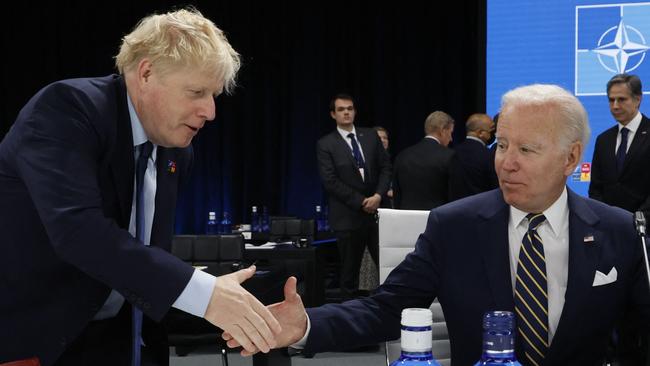Boris Johnson resigns: Joe Biden: UK, US relationship will stay strong
Joe Biden says UK and US remain ‘the closest of friend and allies’ but fails to mention Boris Johnson by name, suggesting he hadn’t warmed to him.

Joe Biden said the US relationship with the UK would “remain strong” but failed to name Boris Johnson in a short statement marking the end of the British leader’s prime ministership, suggesting the US president hadn’t warmed to the flamboyant conservative party leader, whom the president once called a “clone” of Donald Trump.
Mr Biden said the UK and US remained “the closest of friend and allies” in a statement released on Thursday (Friday AEST) a few hours after Mr Johnson announced his resignation without naming Mr Johnson, who along with Mr Biden had led both global efforts to impose tough sanctions on Russia after its invasion of Ukraine and combat climate change.
“The special relationship between our people remains strong and enduring,“ the president said in the statement to mark the end of Mr Johnson’s increasingly scandal-ridden administration, which collapsed after an exodus of ministers earlier this week.
“I look forward to continuing our close co-operation with the government of the United Kingdom, as well as our Allies and partners around the world, on a range of important priorities [including] maintaining a strong and united approach to supporting the people of Ukraine as they defend themselves against Putin‘s brutal war on their democracy, and holding Russia accountable for its actions,” he said.
The veteran MP and former Mayor of London, Mr Johnson had a history of unflattering comments about senior Democrats, including referring to former secretary of state Hillary Clinton as “sadistic nurse in a mental hospital”, and suggesting Barack Obama’s Kenyan ancestry predisposed him to an “ancestral dislike of the British Empire”.
Mr Johnson publicly criticised the Biden administration over its determination to withdraw allied troops, including British and Australian, from Afghanistan in August, a sore point with the president, who had personally insisted on it and later suffered a large drop in his approval rating.
“Could we have done it a bit differently? Maybe we could,” Mr Johnson said in September, further suggesting the inevitable collapse of the Afghan forces was ‘clear’ despite US intelligence.
They also clashed over Northern Ireland, an area of longstanding American interest after centuries of Irish immigration to the US, where the Johnson government sought to rewrite post-Brexit trade agreement amid concerns in Washington it could disrupt the spirit of the 1998 Good Friday agreement, which the US helped facilitate.
Mr Johnson, who won a large majority in the US parliament in the December 2019 UK election, was characterised by observers as a populist ‘Donald Trump’ like character, including by the former US president and Joe Biden.
Mr Biden called Mr Johnson a “physical and emotional clone of Donald Trump” after the 2019 election win.
Mr Trump, who strongly backed Mr Johnson’s push to secure the UK’s departure from the European Union in early 2020, concurred: “Boris is good, he’s tough and he’s smart, they call him Britain’s Trump … that’s a good thing, they like me over there,” the then President said around the same time.
Despite their differences the two leaders worked, along with former Prime Minister Scott Morrison, to establish the AUKUS security pact which is meant to strengthen the defence and intelligence co-operation among the three nations and provide Australia with nuclear-powered submarines.
Mr Biden and Mr Johnson spent time together in Germany and Spain, for G7 and NATO Summits respectively, in recent weeks, where they pushed for tougher sanctions on Russia and further money and military aid for Ukraine.
The pair also worked on climate change policy, using their two nations’ international clout to encourage other countries to draw up more ambitious targets to reduce greenhouse gas emissions ahead of the Glasgow climate conference last year.
They last spoke on the phone in April, where they “affirmed their commitment to continue providing security and humanitarian assistance to Ukraine in the face of ongoing atrocities by Russia,” according to the White House log.
Uncertainty surrounding leadership in the UK will complicate the G20 meeting of foreign ministers underway in Bali, which was already on track to be tense owing to the split among the world’s major powers over how to respond to Russia’s invasion of Ukraine.
Mr Johnson’s political demise could present a second major setback for the three G7 governments leading the global charge to maintain tough sanctions, UK, France and the US, after French president Emmanuel Macron lost his parliamentary majority in June.




To join the conversation, please log in. Don't have an account? Register
Join the conversation, you are commenting as Logout